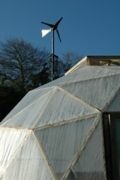NEW! - How to grow with Hydroponics
Dates Available
This course is led by James Strawbridge and horticultural expert Kevin Mills.
About this course: Here at Newhouse Farm we have been developing a new hydroponic growing system that saves time, effort and space. This method of growing doesn't involve any soil so it's perfect for anyone who doesn't have a garden or is short of space but still wants fresh vegetables daily. If you fancy experimenting with a new form of gardening technique then this exciting, practical and informative new course will completely change the way you think about growing your own! The course aims to make the ins and outs of hydroponics and soil-less culture completely accessible and fun so that you'll go home wondering why you ever bothered growing with soil in the first place!
COURSE CONTENTS:
Introduction: What do plants need to grow? What exactly is soil? Just how on earth does hydroponic and soil-free growing work?! All these questions and more will be answered, and we'll also discuss the environmental and health benefits of growing your own food.
Nutrition: An in depth explanation of minerals, how to feed plants, signs of malnutrition, and soil processes. Plus, straight in there getting our hands dirty with bat poo, worm castings, manure and grey water. Lovely!
Conditions: How to make the most out of heat, light, ventilation, and humidity. How to construct a heat sink if you are growing under cover, install an energy efficient grow light, how to use a fish tank heater, and build a solar chimney!
Seeds, Cuttings and Propogating: Examples of how to take useful cuttings and how to sow effectively. Also a look at a solar powered propagation mister to improve your productivity.
Growing mediums: We will demonstrate to you the advantages and disadvantages of working growing systems that use alternatives to soil such as coco coir, wood fibre, rock wool and clay pebbles.
Nutrients: More detailed look at organic nutrients and how to make your own.
Irrigation: Starting with a look at the problems of over, or under-watering your plants and then moving on to using automated systems on timers to make easy, labour saving projects.
Monitoring: The geeky bit: this next section of the course will provide detailed knowledge of how to test pH and EC of your nutrients and explain why they are so important!
Choosing a system: This will cover a wide range of different technologies. Starting with coco coir pot culture and moving on to hydroponic set ups including; ebb and flood, NFT (Nutrient Film Technique), and aeroponics. These will be easy to follow recipes with lists of specific ingredients and explained using functioning models.
 Outdoor: How to set up and grow outdoors.
Outdoor: How to set up and grow outdoors.
IPM: Integrated Pest Management discussion with organic tips and disease control information.
Power: Most systems covered in the course will use a small amount of electrical power for a pump, or for lighting. This part of the course will enable you to install off-grid renewable systems to power your irrigation and make the most out of solar and wind resources.
 Lunch: You will be invited to join us for an organic and tasty Newhouse Farm lunch. Onmivores, vegetarians, vegans… everyone is catered for and we’ll guarantee there’ll be more than enough food to satisfy even the heartiest of appetites! Local ales, organic wines and cordials are also on offer. Lunch time is always a good opportunity to fire questions at James and Kevin and get to meet the rest of the Newhouse Farm team.
Lunch: You will be invited to join us for an organic and tasty Newhouse Farm lunch. Onmivores, vegetarians, vegans… everyone is catered for and we’ll guarantee there’ll be more than enough food to satisfy even the heartiest of appetites! Local ales, organic wines and cordials are also on offer. Lunch time is always a good opportunity to fire questions at James and Kevin and get to meet the rest of the Newhouse Farm team.
Booking: If you'd like to book one of the dates above please at [email protected] to register your interest. Payment details will be forwarded if an applicant is given a place. Full payment is required 21 days before the course date.
Price: Course prices are £145 (inc VAT).
In an attempt to make the course available to people on lower incomes, we offer a limited number of concessions. To apply for a concession please email us at [email protected]
Transport and Accommodation:
The course is held at Newhouse Farm in Cornwall. Full directions will be provided once payment has been cleared. We are a short distance from the local train station; transport can be arranged if necessary. Details of B&Bs in the village will be provided upon booking.
What you need to bring:
Newhouse Farm is a working smallholding with plenty of mud, uneven ground and nettles. So please bring sensible footwear (wellies or trainers are good but definitely no flip flops). Also as we cannot guarantee the weather so a raincoat or umbrella could come in handy too.
Newhouse Farm Course days are typically organised as follows:
|
Time |
Activity |
|
0930 - 1000 |
Course meets with organic tea, coffee and nibbles |
|
1000 - 1230 |
Introduction, theory (!), and practical demonstrations |
|
1230 - 1330 |
Lunch break - you are invited to join us. We are never sure how many people will be there - long arms are an advantage! |
|
1330 - 1630 |
More theory and practical work |
|
1630 - 1730 |
Tea, coffee and more nibbles - an opportunity to discuss individual projects. |
|
1730 ish |
Course disperses |


